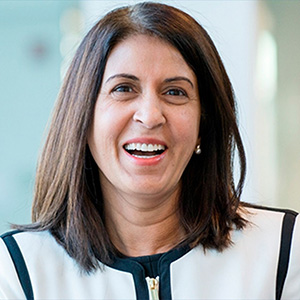The interview below is part of an ongoing effort by McGuireWoods to profile women leaders in private equity (PE). To read previous profiles, click here. To recommend a woman for a future interview, email WPEF@mcguirewoods.com.

Geeta Vemuri, Ph.D., MBA, is founder and managing partner at Agent Capital, where she leads and oversees all activities, including portfolio management, new investments and operation activities. Vemuri previously was the managing partner of Baxter Ventures and the managing partner of Baxalta Ventures, where she led each corporate venture capital arm with more than $300 million under management. Prior to Baxter, Vemuri was a partner at Quaker Partners where she focused on biotech and healthcare investments.
She served on the boards of numerous companies, including Cempra, Covagen, Gadeta, Naurex, Ocular Therapeutix, Protez Pharmaceuticals, Syntimmune and True North Therapeutics. She holds a Ph.D. in biochemistry from Indian Institute of Sciences and an MBA from The Wharton School at the University of Pennsylvania.
Q: What attracted you to PE?
Dr. Geeta Vemuri: When I started my career, I didn’t know what PE meant, but I’ve always felt that building companies is a great endeavor. You’re bringing innovation forward and creating employment for people. Those are fantastic things to do. When you build a company, you’re building an institution where people support each other and look after one another and their needs as they grow.
I’ve worked on Wall Street, focused on tracking companies based off their revenues. That was interesting, but these were companies that already were established. I wanted to get down to the ground level to see how companies were built and then move forward.
I was drawn to biotech because of its importance, and because it had been my area of study. We all want to save as many lives as we can and see people happy and healthy. One way to accomplish these goals is through investments in private companies that harness innovation from academia. The United States spends so much money on government-funded biotech programs and supporting universities doing work in the field. We can take that science and use it to create new companies. The opportunity to do this work and support these innovators attracted me to PE.
Q: Why do you support providing capital to women entrepreneurs?
GV: We don’t look at whether a company is run by women or men. We just want to back the right companies. If a company happens to be run by women, that’s great, and we’ll do whatever we can to support them and help them be successful.
Q: What advice would you provide to a woman-led company interested in securing PE?
GV: Go for it! This is the perfect time for women CEOs to raise capital from PE companies with boards comprised of men and women. It’s not just women who support other women. Male investors have become more supportive of women as well after seeing the impressive successes of women-led companies.
Q: What do you think is the biggest challenge facing women entrepreneurs? What advice would you provide to overcome it?
GV: Being an entrepreneur is not easy and requires an inordinate amount of grit. The challenges are largely the same for women or men on a macro-level.
My advice is get in the game and stay in the game. Women often have too many other responsibilities, so they may be more inclined to stop pursuing entrepreneurship when faced with challenges. My advice to them: Don’t give up.
Q: Can you share a personal story that exemplifies the value of women entrepreneurship?
GV: Women entrepreneurs have a lot to offer, not just to the world ecosystem but to our families as well. My husband loves that I make more money, and he loves that we can spend what I earn on what we enjoy. Earning money and taking care of the family should not be burdens that just fall to one person. It’s a shared responsibility for both of us. If we don’t have equal thinking, partnership and representation in a relationship, that’s not a very good overall structure for success.
Women make great entrepreneurs because we have an inherent tendency to cobble things together effectively and make things work, whether it’s for business or for home. The ability to be organized and problem-solve is what makes women entrepreneurs successful.
To contact Dr. Geeta Vemuri, email geeta@agentcapital.com.